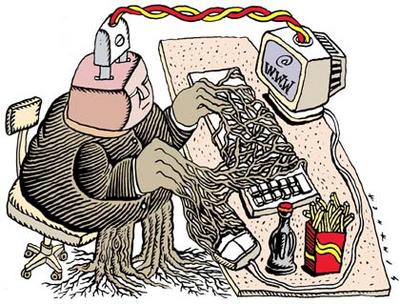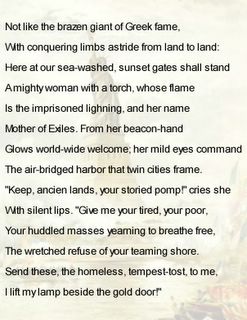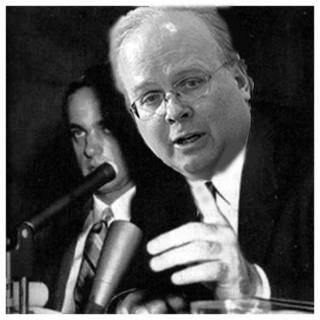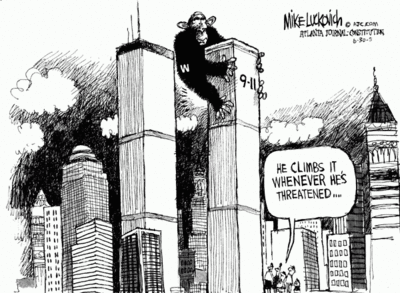

There will be little or no posting here at Mtn. Philosopher until Aug 13th. Genna and I are taking a 25 day road trip out west and to DC. You can follow our adventures here - http://deadwoodtodc.blogspot.com We hope to post every other day or so.
Sunday, July 17, 2005
Hiatus & Adventure
Posted by John deVille at 7/17/2005 09:39:00 PM |
Monday, July 11, 2005
Better Than Viagra

Full Text at ThinkProgress
QUESTION: Scott, can I ask you this: Did Karl Rove commit a crime?
MCCLELLAN: Again, David, this is a question relating to a ongoing investigation, and you have my response related to the investigation. And I don't think you should read anything into it other than: We're going to continue not to comment on it while it's ongoing.
Advertisement
QUESTION: Do you stand by your statement from the fall of 2003, when you were asked specifically about Karl and Elliot Abrams and Scooter Libby, and you said, "I've gone to each of those gentlemen, and they have told me they are not involved in this"?
QUESTION: Do you stand by that statement?
MCCLELLAN: And if you will recall, I said that, as part of helping the investigators move forward on the investigation, we're not going to get into commenting on it. That was something I stated back near that time as well.
QUESTION: Scott, this is ridiculous. The notion that you're going to stand before us, after having commented with that level of detail, and tell people watching this that somehow you've decided not to talk. You've got a public record out there. Do you stand by your remarks from that podium or not?
MCCLELLAN: I'm well aware, like you, of what was previously said. And I will be glad to talk about it at the appropriate time. The appropriate time is when the investigation...
QUESTION: (inaudible) when it's appropriate and when it's inappropriate?
MCCLELLAN: If you'll let me finish.
QUESTION: No, you're not finishing. You're not saying anything.
You stood at that podium and said that Karl Rove was not involved. And now we find out that he spoke about Joseph Wilson's wife. So don't you owe the American public a fuller explanation. Was he involved or was he not? Because contrary to what you told the American people, he did indeed talk about his wife, didn't he?
MCCLELLAN: There will be a time to talk about this, but now is not the time to talk about it.
QUESTION: Do you think people will accept that, what you're saying today?
MCCLELLAN: Again, I've responded to the question.
QUESTION: You're in a bad spot here, Scott...
(LAUGHTER)
... because after the investigation began -- after the criminal investigation was under way -- you said, October 10th, 2003, "I spoke with those individuals, Rove, Abrams and Libby. As I pointed out, those individuals assured me they were not involved in this," from that podium. That's after the criminal investigation began.
Now that Rove has essentially been caught red-handed peddling this information, all of a sudden you have respect for the sanctity of the criminal investigation.
MCCLELLAN: No, that's not a correct characterization. And I think you are well aware of that.
We know each other very well. And it was after that period that the investigators had requested that we not get into commenting on an ongoing criminal investigation.
And we want to be helpful so that they can get to the bottom of this. Because no one wants to get to the bottom of it more than the president of the United States.
I am well aware of what was said previously. I remember well what was said previously. And at some point I look forward to talking about it. But until the investigation is complete, I'm just not going to do that.
QUESTION: So you're now saying that after you cleared Rove and the others from that podium, then the prosecutors asked you not to speak anymore and since then you haven't.
MCCLELLAN: Again, you're continuing to ask questions relating to an ongoing criminal investigation and I'm just not going to respond to them. QUESTION: When did they ask you to stop commenting on it, Scott? Can you pin down a date?
MCCLELLAN: Back in that time period.
QUESTION: Well, then the president commented on it nine months later. So was he not following the White House plan?
MCCLELLAN: I appreciate your questions. You can keep asking them, but you have my response.
QUESTION: Well, we are going to keep asking them.
When did the president learn that Karl Rove had had a conversation with a news reporter about the involvement of Joseph Wilson's wife in the decision to send him to Africa?
MCCLELLAN: I've responded to the questions.
QUESTION: When did the president learn that Karl Rove had been...
MCCLELLAN: I've responded to your questions.
QUESTION: After the investigation is completed, will you then be consistent with your word and the president's word that anybody who was involved will be let go?
MCCLELLAN: Again, after the investigation is complete, I will be glad to talk about it at that point.
QUESTION: Can you walk us through why, given the fact that Rove's lawyer has spoken publicly about this, it is inconsistent with the investigation, that it compromises the investigation to talk about the involvement of Karl Rove, the deputy chief of staff, here?
MCCLELLAN: Well, those overseeing the investigation expressed a preference to us that we not get into commenting on the investigation while it's ongoing. And that was what they requested of the White House. And so I think in order to be helpful to that investigation, we are following their direction.
QUESTION: Scott, there's a difference between commenting on an investigation and taking an action...
MCCLELLAN: (inaudible)
Posted by John deVille at 7/11/2005 03:41:00 PM |
Saturday, July 09, 2005
Thursday, July 07, 2005
1,000 Maimed & Dead People "Working to Our Advantage"
Plagiarized from Media Matters
-----------------------------------
The following exchange between Fox News host Brian Kilmeade and Fox News business contributor and substitute host Stuart Varney occurred during breaking news coverage of the attacks on London subways and buses on the July 7 edition of Fox News' Fox & Friends:
KILMEADE: And he [British Prime Minister Tony Blair] made the statement, clearly shaken, but clearly determined. This is his second address in the last hour. First to the people of London, and now at the G8 summit, where their topic Number 1 --believe it or not-- was global warming, the second was African aid. And that was the first time since 9-11 when they should know, and they do know now, that terrorism should be Number 1. But it's important for them all to be together. I think that works to our advantage, in the Western world's advantage, for people to experience something like this together, just 500 miles from where the attacks have happened.
VARNEY: It puts the Number 1 issue right back on the front burner right at the point where all these world leaders are meeting. It takes global warming off the front burner. It takes African aid off the front burner. It sticks terrorism and the fight on the war on terror, right up front all over again.
KILMEADE: Yeah.
----------------------------
What sick, confused people.
Posted by John deVille at 7/07/2005 03:50:00 PM |
A Democratic Republic or a Big Fat Lie
Fellow philosopher. Dennis, who blogs at Spanky's Speculations, writes a nice response to the position in the comments section, which held that the U.S. is a "supposed to be a representive republic, not a democracy." Dennis says:
"A democracy is a form of government in which the public wields the biggest share of political authority, and exercises it either directly or through representatives. We are a republic (a form of government in which representatives lead on behalf of the people) and we are also a democracy. Whenever someone says we are a republic but not a democracy, I cringe, because it means they've missed something crucial to the American way of life. We are, and have always been, a democratic republic, just as the founding fathers intended.
The last sentence in the Gettysburg Address is this: "It is rather for us to be here dedicated to the great task remaining before us -- that from these honored dead we take increased devotion to that cause for which they gave the last full measure of devotion -- that we here highly resolve that these dead shall not have died in vain -- that this nation, under God, shall have a new birth of freedom -- and that government of the people, by the people, for the people, shall not perish from the earth."
It is from the "democratic" part of the equation that we have that concept--a government of, by and for the people. A republic that isn't democratic need only be a government for the people. The Union of Soviet Socialist Republics demonstrated that the concept of individual freedom isn't crucial to a republican form of government, either. Yes, Virginia, we are a republic, but that can never, ever be all that we are. We're a democratic republic, or we're a big, fat lie."
Posted by John deVille at 7/07/2005 08:17:00 AM |
Tuesday, July 05, 2005
"Not Like the Brazen Giant of Greek Fame..."
From the pedestal of the Statue of Liberty
The ever-eloquent Billmon captures my feelings with this powerful essay. Definitely worth reading the whole thing. Here's your snip:
I'm not a big fan of patriotism, at least not as most Americans understand the word. Patriotism is just another word for nationalism, and nationalism in my book is the modern equivalent of the black plague -- an incubator of xenophobia at its least, a killer of millions at its absolute worst. And we've seen enough of the absolute worst over the past century to understand where nationalism could ultimately lead: the extinction of the entire human race.
Still, there are emotional attachments to home -- to the familiar, the dear, the remembered -- that go deeper than the intellect and pull harder than reason. Tribal loyalty is a powerful thing. On the morning of 9/11, I was as much a patriot as any man or woman alive, and would have greedily torn Bin Ladin to pieces with my own hands to avenge "our" dead.
But hatred and revenge are patriotism's curse, not its justification. When Lincoln spoke of "mystic cords of memory" and urged his countrymen to put their common heritage ahead of their political divisions, he wasn't appealing to their tribal loyalties, but their loyalty to an ideal: democratic government under the law. If American patriotism has any claim to be an exception to the general run of blind national chauvinism, it has to be found in that idea. If America is to be an exceptional nation, one worth glorifying above all others, it has to be because of the quality of her justice and the strength of her democracy -- not because of the language she speaks, or the God she worships or the color of her skin. And not because of her material wealth or military power or imperial ambitions. Least of all those.
Pat Buchanan and I agree on very few things, but he wrote something many years ago that I can endorse wholeheartedly: "America was a great country before she was a rich country." In many ways a greater country, I would probably add -- not because she was poor (if you've seen real poverty, Third World poverty, you know there's nothing to admire about it) but because she stood a little less apart from the rest of humanity, and had to rely a little more heavily on the promises inscribed on the Statue of Liberty, rather than power of her aircraft carriers, to impress the world.
What I saw in Jimmy John's hot dog stand was the ghost of an America I used to know -- a land of little guys looking for a place to build something. Of strong unions and good-paying jobs that didn't require a PhD. Of black and white televisions where you could watch the cheesiest ads imaginable. Of corner drug stores and transistor radios and long evenings spent sitting on the front porch, talking to the neighbors.
Posted by John deVille at 7/05/2005 10:05:00 AM |
Monday, July 04, 2005
Another sign that communism is dead in China...
 from Slate
from Slate"State media has also highlighted cases of obsessed Internet gamers, some of whom have flunked out of school, committed suicide or murder. Nonetheless, Internet cafes continue to thrive, with outlets found in even the smallest and poorest of villages. Most are usually packed late into the night.
Dr. Kimberly Young, a Bradford, Pa., clinical psychologist whose 1998 book on Internet addiction has been translated into Chinese, says she's not surprised the Chinese would face problems with Internet overuse.
"They are catching up with a lot of our technology, and certainly at that juncture, are now able to run into some of the same difficulties," Young said."
Posted by John deVille at 7/04/2005 02:20:00 PM |
Mistakes re-visited, a Hawk's Perspective
"It is perfectly true that foresight is far harder than "20-20 hindsight." Many, if not most, of these problems were, however, brought to the attention of the President, National Security Council, State Department, Department of Defense, and intelligence community in the summer and fall of 2002, and in Interagency forums. No one accurately prophesized all of the future, but many inside and outside government warned what it might be. The problem was not that the system did not work in providing many key elements of an accurate assessment, it was that the most senior political and military decision makers ignored what they felt was negative advice out of a combination of sincere belief, ideological conviction, and political and bureaucratic convenience."
{ed note: This is what happens when you run a war like you ran Arbusto and Harken and there's no Harvard endowment fund to bail you out. Or, more to the point, it's running the war in the same cynical, insular, unilateral, "fuck-you", Mayberry-Machivellian, fashion in which the Bushies do EVERYTHING!}
• A failure to accurately assess the nature of Iraqi nationalism, the true level of culture differences, and the scale of Iraq problems. This failure of strategic assessment included the failure to see the scale of Iraq’s ethnic and sectarian differences, its economic weaknesses and problems, the difficulty of modernizing an infrastructure sized more to 16-17 million than the current population of 25-26 million, unrealistic estimates of "oil wealth," the probable hardcore support for the former regime in Sunni areas, secular versus theocratic tensions, the impact of tribalism, the impact of demographics in a society so young and with so many employment problems, and a host of other real-world problems that became US and Coalition problems the moment Coalition forces crossed the border.
• The failure to plan and execute effective broader information operations before, during and after the invasion to win the "hearts and minds of Iraqis," persuade them that the Coalition came a liberators that would leave rather than occupiers who would stay and exploit Iraq, and that the Coalition would provide aid and support to an truly independent government and state. A secondary failure to anticipate and defuse the flood of conspiracy theories certain to follow Coalition military action.
• The failure to plan and execute efforts to maintain the process of governance at the local, provincial, and central level; to anticipate the risk the structure of government would collapse and the risk of looting, and to create a plan for restructuring the
military, police, and security forces -- all of which needed to be proclaimed and publicized before, during, and immediately after the initial invasion to win the support of Iraqi officials and officers who were not linked to active support of Saddam Hussein and past abuses, and to preserving the core of governance that could lead to the rapid creation of both a legitimate government and security.
• Broad failures by what a leading officer involved in planning operations in Iraq by "quiescent US military and Intelligence community leaders who observed the distortion/cherry picking of data that lead to erroneous conclusions and poor planning," but failed to press their case or force the issue.
• Over-reliance on exile groups with limited credibility and influence in Iraq.
• Miscalculations about UN support, NATO & coalitions, and transit through Turkey.
• Failing to the provided the personnel and skills necessary to secure Iraqi rear areas and urban areas as the Coalition advanced, and to prevent the massive looting of
government offices and facilities, military bases, and arms depots as the during and after the fighting: A process that effectively destroyed the existing structure of governance and security without making any initial effort to replace it.
• The creation of a small cadre of civilians and military in the Office of Reconstruction and Assistance, many initially recruited for only three month tours, that was charged with a largely perfunctory nation building task, given negligible human and financial resources, not allowed meaningful liaison with regional powers, and not integrated with the military command.
• Replacing ORHA after the fall of Saddam Hussein with the Coalition Provisional Authority (CPA), and then suddenly improvising a vast nation building and stability effort, recruiting and funding such an operation with little time for planning, and then attempting to carry out the resulting mission along heavily ideological lines that attempt to impose American methods and values on Iraq.
• Placing the CPA and US commands in separate areas, creating large, secure zones that isolated the US effort from Iraqis, and carrying out only limited coordination with other Coalition allies.
• Staffing the CPA largely with people recruited for short tours, and often chosen on the basis of political and ideological vetting, rather than experience and competence.
• A failure not only to anticipate the threat of insurgency and outside extremist infiltration, in spite of significant intelligence warning, but to deploy elements of US forces capable of dealing with counterinsurgency, civil-military operations, and nation building as US forces advanced and in the immediate aftermath of the collapse of the regime. Creating regional commands based on administrative convenience, rather than need, and leaving most of the initial tasks of stability operations and nation building up to improvisation by individual local commanders who had minimal or no expert civilian support.
• This failure was compounded by a lack of language and area skills and training on the part of most US military forces, and intelligence capabilities designed to provide the human intelligence (HUMINT), technical collection, analytic capabilities, and "fusion" centers necessary for stability, counterterrorist and counterinsurgency operations.
• Planning for premature US military withdrawals from Iraq before the situation was clear or secure, with major reductions initially planned to begin some three months after the fall of Saddam’s regime, rather than planning, training, and equipping for a sustained period of stability operations.
• Failure to anticipate and prepare for Iraqi expectations after the collapse of Saddam’s regime, and for the fact that many Iraqis would oppose the invasion and see any sustained US and coalition presence as a hostile occupation.
• A failure to react to the wartime collapse of Iraqi military, security, and police forces and focus immediately on creating effective Iraqi forces – a failure that placed a major and avoidable burden on US and other coalition forces and compounded the Iraqi feeling that Iraqi had been occupied by hostile forces.
• A failure to honestly assess the nature and size of the Iraqi insurgency as it grew and became steadily more dangerous.
• The failure to provide, or even have available, anything like the civilian elements in the US government, necessary for nation building and stability operations. These problems were particular serious in the State Department and other civilian agencies, and much of the civilian capability the US did have was not recruited or willing to take risks in the field.
• Then creating an occupation authority that planned for several years of occupation, as if a US-led coalition could improves it own values and judgments about the Iraqi people, politics, economy, and social structure for a period of some three years – rather than expedite the transfer of sovereignty back to Iraq as quickly as possible. The record is mixed, but the CPA only seems to have decided to expedite the transfer of sovereignty in October 2003, after the insurgency had already become serious, and its choice of June 2004 for doing so was largely arbitrary. Even then, it failed to make its plans sufficiently convincing to much of the Iraqi people.
Posted by John deVille at 7/04/2005 12:55:00 PM |
I see the Future...
Mahablog calls it right on the impending SC judicial nomination when she writes:
I think W wants a "fierce, nasty, and protracted fight." In fact, I think it might well be the only thing that can save his foundering presidency."Liberals are hoping for a not-activist judge who will rule based on law and the facts of the case. The Right is howling for a way-activist judge who will impose a hard right interpretation to everthing, damn the case and damn the Constitution. And this is happening while the Right is snarling that it's the Left who wants to use the Courts to impose its will."
But I disagree with her prediction here:
"If he nominates anyone who displeases the Right, he's likely to lose much of their support, and right now that's pretty much all he has. If he does nominate a troglodyte the Senate confirmation fight will be fierce and nasty and protracted, and he can't count on the GOP Senators to march in lockstep. He's got to find someone moderate enough to keep the Senate GOP together, but enough of a whackjob to please the Right."
If he goes the "troglodyte" route (as I suggested here), here's all the benefits he gets:
*Immediate tightening of his base. The Dobsians will pull out all stops. They will raise money like crazy, run ads, and turn the culture war artillery rate up to "11".Here comes Jabba!
*The base, which is starting to have a doubt or two at the margins, about the war, shifts its focus to a place where the light is much better on W.
*The media's attention also shifts, away from the war, and to the culture wars. W can't win the culture war either but shifting attention away from the far more consequential conflict is a HUGE win.
*If said troglodyte is filibustered/rejected, then the GOP has another fundraising issue for 2006, as well as an issue that distracts from the war. Additionally, W can then "lower his price" and nominate the moderate, playing to a "healing the nation" narrative that the MSM will be all too happy to indulge, and for which the far right will forgive, since he tried mightily to nominate a Child of Jesus first, only to be temporarily thwarted by the Pharisees, uh, liberal Democrats.
*And, if W were to nominate a moderate from the outset, he can kiss off his base, and the rest of his presidency.
Posted by John deVille at 7/04/2005 11:45:00 AM |
Just Like Paris Hilton....

...we're expensive and stupid.
From Anne:
Let me get this straight. Capitalists want cheap labor. In order to get cheap labor, you need a population pool who is too stupid to fight for better pay. Except a good capitalist doesn't to spend the extra money it takes to train illiterates.
Then you have politicians who want a stupid population so they will keep voting against their own interests and remain life long indentured servants. Except, because they are stupid and poor, they get sick a lot more often because they don't know how to stay well and can't afford preventative medicine, so they go to the ER more often which raises health care costs for everyone, including capitalists. Plus, now that the indentured servants have now shot their wad on ER visits, they can't afford to buy the crap that capitalists make, so the capitalists lose even more money.
So, when Toyota wants to build a plant on this side of the big water, they choose Canada over America. Why? Because building a plant in America costs a lot more money in health care costs and training. So, we're expensive and stupid.
Just like Paris Hilton...
Posted by John deVille at 7/04/2005 11:02:00 AM |
American Genius
 As relevant as ever. Absolute genius.
As relevant as ever. Absolute genius.
Hat tip to Tom, John, James, and Ben, with thanks to the signatories who put their lives and fortunes on the line.
The Declaration of Independence of the Thirteen Colonies
The unanimous Declaration of the thirteen united States of America,
When in the Course of human events, it becomes necessary for one people to dissolve the political bands which have connected them with another, and to assume among the powers of the earth, the separate and equal station to which the Laws of Nature and of Nature's God entitle them, a decent respect to the opinions of mankind requires that they should declare the causes which impel them to the separation.
We hold these truths to be self-evident, that all men are created equal, that they are endowed by their Creator with certain unalienable Rights, that among these are Life, Liberty and the pursuit of Happiness. --That to secure these rights, Governments are instituted among Men, deriving their just powers from the consent of the governed, --That whenever any Form of Government becomes destructive of these ends, it is the Right of the People to alter or to abolish it, and to institute new Government, laying its foundation on such principles and organizing its powers in such form, as to them shall seem most likely to effect their Safety and Happiness.
Prudence, indeed, will dictate that Governments long established should not be changed for light and transient causes; and accordingly all experience hath shewn, that mankind are more disposed to suffer, while evils are sufferable, than to right themselves by abolishing the forms to which they are accustomed. But when a long train of abuses and usurpations, pursuing invariably the same Object evinces a design to reduce them under absolute Despotism, it is their right, it is their duty, to throw off such Government, and to provide new Guards for their future security. —Such has been the patient sufferance of these Colonies; and such is now the necessity which constrains them to alter their former Systems of Government. The history of the present King of Great Britain [George III] is a history of repeated injuries and usurpations, all having in direct object the establishment of an absolute Tyranny over these States. To prove this, let Facts be submitted to a candid world.
He has refused his Assent to Laws, the most wholesome and necessary for the public good.
He has forbidden his Governors to pass Laws of immediate and pressing importance, unless suspended in their operation till his Assent should be obtained; and when so suspended, he has utterly neglected to attend to them.
He has refused to pass other Laws for the accommodation of large districts of people, unless those people would relinquish the right of Representation in the Legislature, a right inestimable to them and formidable to tyrants only.
He has called together legislative bodies at places unusual, uncomfortable, and distant from the depository of their public Records, for the sole purpose of fatiguing them into compliance with his measures.
He has dissolved Representative Houses repeatedly, for opposing with manly firmness his invasions on the rights of the people.
He has refused for a long time, after such dissolutions, to cause others to be elected; whereby the Legislative powers, incapable of Annihilation, have returned to the People at large for their exercise; the State remaining in the mean time exposed to all the dangers of invasion from without, and convulsions within.
He has endeavoured to prevent the population of these States; for that purpose obstructing the Laws for Naturalization of Foreigners; refusing to pass others to encourage their migrations hither, and raising the conditions of new Appropriations of Lands.
He has obstructed the Administration of Justice, by refusing his Assent to Laws for establishing Judiciary powers.
He has made Judges dependent on his Will alone, for the tenure of their offices, and the amount and payment of their salaries.
He has erected a multitude of New Offices, and sent hither swarms of Officers to harass our people, and eat out their substance.
He has kept among us, in times of peace, Standing Armies without the consent of our legislatures.
He has affected to render the Military independent of and superior to the Civil power.
He has combined with others to subject us to a jurisdiction foreign to our constitution and unacknowledged by our laws; giving his Assent to their Acts of pretended Legislation:
For Quartering large bodies of armed troops among us:
For protecting them, by a mock Trial, from punishment for any Murders which they should commit on the Inhabitants of these States:
For cutting off our Trade with all parts of the world:
For imposing Taxes on us without our Consent:
For depriving us, in many cases, of the benefits of Trial by Jury:
For transporting us beyond Seas to be tried for pretended offences:
For abolishing the free System of English Laws in a neighbouring Province, establishing therein an Arbitrary government, and enlarging its Boundaries so as to render it at once an example and fit instrument for introducing the same absolute rule into these Colonies:
For taking away our Charters, abolishing our most valuable Laws, and altering fundamentally the Forms of our Governments:
For suspending our own Legislatures, and declaring themselves invested with power to legislate for us in all cases whatsoever.
He has abdicated Government here, by declaring us out of his Protection and waging War against us.
He has plundered our seas, ravaged our Coasts, burnt our towns, and destroyed the lives of our people.
He is at this time transporting large Armies of foreign Mercenaries to compleat the works of death, desolation and tyranny, already begun with circumstances of Cruelty and perfidy scarcely paralleled in the most barbarous ages, and totally unworthy the Head of a civilized nation.
He has constrained our fellow Citizens taken Captive on the high Seas to bear Arms against their Country, to become the executioners of their friends and Brethren, or to fall themselves by their Hands.
He has excited domestic insurrections amongst us, and has endeavoured to bring on the inhabitants of our frontiers, the merciless Indian Savages, whose known rule of warfare, is an undistinguished destruction of all ages, sexes and conditions.
In every stage of these Oppressions We have Petitioned for Redress in the most humble terms: Our repeated Petitions have been answered only by repeated injury. A Prince whose character is thus marked by every act which may define a Tyrant, is unfit to be the ruler of a free people.
Nor have We been wanting in attentions to our British brethren. We have warned them from time to time of attempts by their legislature to extend an unwarrantable jurisdiction over us. We have reminded them of the circumstances of our emigration and settlement here. We have appealed to their native justice and magnanimity, and we have conjured them by the ties of our common kindred to disavow these usurpations, which, would inevitably interrupt our connections and correspondence. They too have been deaf to the voice of justice and of consanguinity. We must, therefore, acquiesce in the necessity, which denounces our Separation, and hold them, as we hold the rest of mankind, Enemies in War, in Peace Friends.
We, therefore, the Representatives of the united States of America, in General Congress, Assembled, appealing to the Supreme Judge of the world for the rectitude of our intentions, do, in the Name, and by the Authority of the good People of these Colonies, solemnly publish and declare, That these United Colonies are, and of Right ought to be Free and Independent States; that they are Absolved from all Allegiance to the British Crown, and that all political connection between them and the State of Great Britain, is and ought to be totally dissolved; and that as Free and Independent States, they have full Power to levy War, conclude Peace, contract Alliances, establish Commerce, and to do all other Acts and Things which Independent States may of right do. And for the support of this Declaration, with a firm reliance on the protection of divine Providence, we mutually pledge to each other our Lives, our Fortunes and our sacred Honor.
The signers of the Declaration represented the new states as follows:
New Hampshire
Josiah Bartlett, William Whipple, Matthew Thornton
Massachusetts
John Hancock, Samual Adams, John Adams, Robert Treat Paine, Elbridge Gerry
Rhode Island
Stephen Hopkins, William Ellery
Connecticut
Roger Sherman, Samuel Huntington, William Williams, Oliver Wolcott
New York
William Floyd, Philip Livingston, Francis Lewis, Lewis Morris
New Jersey
Richard Stockton, John Witherspoon, Francis Hopkinson, John Hart, Abraham Clark
Pennsylvania
Robert Morris, Benjamin Rush, Benjamin Franklin, John Morton, George Clymer, James Smith, George Taylor, James Wilson, George Ross
Delaware
Caesar Rodney, George Read, Thomas McKean
Maryland
Samuel Chase, William Paca, Thomas Stone, Charles Carroll of Carrollton
Virginia
George Wythe, Richard Henry Lee, Thomas Jefferson, Benjamin Harrison, Thomas Nelson, Jr., Francis Lightfoot Lee, Carter Braxton
North Carolina
William Hooper, Joseph Hewes, John Penn
South Carolina
Edward Rutledge, Thomas Heyward, Jr., Thomas Lynch, Jr., Arthur Middleton
Georgia
Button Gwinnett, Lyman Hall, George Walton
For additional information about the Declaration of Independence, see these sites:
National Archives and Records Administration: Declaration of Independence
Library of Congress: About the Declaration of Independence
Posted by John deVille at 7/04/2005 09:31:00 AM |
Saturday, July 02, 2005
Persuasion, Democratic Party Strategy, and "Wicked Problems"
As usual, Chapomatic has provided food for thought, this time with a mere link.
Brian Leiter, who teaches philosophy and law (Jurisprudence and Evidence), has recently blogged on the wisdom of engaging in persuasion, as opposed to the focusing of one's energies on coherently staking out a position, regardless of its supposed persuasive qualities. He dismisses (correctly) the notion that all positions have two legitmate sides. He does this by delineating the differences between "hard questions" ("What is Foucault's view of the cognitive and epistemic status of the claims of the human sciences?") and "easy questions" ("Are Bush's economic policies in the interests of most people?"). Of this latter category, he writes: "These questions, and many others, are easily addressed in the blogosphere, since there is no serious--or at least no honest or intelligent--dispute about the epistemic merits of the possible answers."
It is precisely this dismissive attitude that Marc Danzinger, a.k.a. Armed Liberal, at Winds of Change takes issue with, essentially characterizing Leiter as an ivory tower elitist:
"And note if you will that it applies to Duncan Black, Tbogg, Yglesias (all too often) and others on the left...it's a variant of "I just can't believe you aren't bowing the ineffable rightness of my positions" that we're used to seeing from the smart fat guy in the isolated cubicle - the one who knows more than anyone else about the fine points of the interactions between the Venice Specific Plan, the California Coastal Act, and Los Angeles planning law, or multi-threaded processing on early x86 chips, or the student films of George Lucas, or prewar Hegelian theory in the works of Lukács."Danzinger wants Leiter to come out of his tower, uh, "cubicle", and talk to the regular folks and persuade them, even if that means slightly altering his position(s) -- moving to the middle as it were. Leiter sees such talk and political moderation as a fruitless enterprise, that the masses who love Bush live in a place where no rational argument can penetrate. Danzinger responds to this sentiment in his comments section that Leiter's position is essentially a cop out which forgoes the opportunity to advance a progressive ideal or idea:
"The issue is with people - people who may actually have good ideas - who are unwilling to roll up their sleeves and recognize that having the idea is about 10% of the process; getting it diffused and adopted is the balance. And what these people {like Leiter - ed} tend to do is to casually dismiss - out of some style or motive I don't understand - everyone who doesn't immediately start singing in key with them."I agree entirely with Danzinger on this key point. And if the Democrats want to win, they are going to have to go in this direction. They Democratic Party leadership must find common ground with the working class and its New Deal ideals. In fact, finding that common ground between the self-interests of nation and the self-interests of the working class is the foundation of the New Deal. Any substantive rebirth of the Democratic Party has to occur at this nexus.
Leiter believes that anything other than a hardline position on key issues constitutes unprincipled compromise and he sees universities as citadels of truth that should remain elevated above popular attempts to get the academy to bend to folk wisdom. I can live with that. And to be fair to Leiter, he openly admits that ideas in his blog would make for bad electoral strategy -- we need Dean, etc., to grok this point -- bigtime.
Leiter sees his blog as merely better arming those who already agree with him. That's ok, but as he says, it won't win elections. The Deaniacs could have been the best informed volunteers in American political history; they could have posessed the sharpest forensic skills since Lincoln and Douglass. And none of that would have forestalled Dean's Iowa debacle. It wasn't the scream and the chattering class that did the Dean campaign in, it was Dean's and the Deaniacs' inability to connect with voters. Connection and the fostering of voter rapport doesn't come from better sales materials or a better pitch, it comes from creating the perception in the voters' minds that they have been listened to. For one brief, shining moment, the Kerry campaign did just that. Kerry sat in the town halls, the fire stations, and the homes of Iowans and listened and then thoughtfully responded. He won the caucuses in a huge upset. And then hubris and isolation set in until his November defeat.
If Dean's appearance last week on the Daily Show is any indication of how the 2006 message is going to be crafteded and disseminated, we're going to get creamed again. Jon Stewart gave Dean no less than three chances to ennunciate a clear message on how the Democrats were different than the GOP and Dean whiffed it three times, responding with the usual vague boilerplate and some shit about "hope."
In short, the Democratic Party must clearly research the economic needs and desires of the working class and build out from there. That should be easy. But the party of Biden, Dodd, Lieberman etc. which is so beholden to the ruling class and so out of touch with its Jeffersonian/Jacksonian/Rooseveltian roots to the point that they went along with a bitch of a bankruptcy reform law indicates they have a long row to hoe.
There is, however, one arena in which Leiter's hardline, citadel approach makes for good politics and Danzinger's inclination for "moderation" makes for bad.
Where Leiter delineated between "hard questions" and "easy questions", Danzinger, cribbing from Horst Rittel, writes of "wicked problems" and "tame problems."
"Tame problems may be quite complex, but the lend themselves to analysis and solution by known techniques. A traditional linear processes is sufficient to produce a workable solution to a tame problem in an acceptable period time, and it is clear when a solution has been reached."
A "wicked problem" is one where:
"requirements are volatile, constraints keep changing, stakeholders can’t agree and the target is constantly moving, in all likelihood, you are dealing with a wicked problem. If considerable time and effort has been spent, but there isn’t much to show for it, there is probably a wicked problem lurking somewhere. "In short, Danzinger conflates Leiter's "easy questions" ("Was the U.S. justified in invading Iraq?") with Rittel's "wicked problems" to make the point that reasonable people can disagree, and making the overarching point that it is foolish and arrogant for those of us who are futher to the left than Danzinger and his fellow moderates to be so strident in our criticism and reluctant to entertain alternate positions.
This is almost reasonable. Until one considers one key point of Rittel's which Danzinger did not cite along with the ten characteristics of "wicked problems":
"The appropriate way to tackle wicked problems is to discuss them. Consensus emerges through the process of laying out alternative understandings of the problem, competing interests, priorities and constraints. The application of more formal analysis tools is impossible before the problem can be articulated in a concise, agreed upon, well-bounded manner. In other words, the problem must first be tamed."Again, here's Leiter's whole list of "easy questions" which Danzinger wants to re-label as "wicked problems":
Was the U.S. justified in invading Iraq?If these are indeed "wicked" as opposed to "easy", then the Bush Administration and the GOP have certainly not followed the prescription for "taming" these problems. There was never a legitimate discussion of the war, the economic policies e.g. tax cuts and massive deficit spending, nor discussion of the social security "crisis." In a similar fashion, the Bushies are willing to be fuzzy on evolution so long as it suits their political needs.
Are Bush's economic policies in the interests of most people?
Is Darwin's theory of evolution by natural selection a well-confirmed scientific theory?
Is there a social security "crisis"?
There has been no discussion of constraints, alternate understandings, competing interests, nor priorities. What we have had is ramrod government which the Downing St. Memo crystallized so perfectly. That is, make the decision and sell it by any means necessary. The decision was made to invade Iraq, cut the taxes for the super-rich, dismantle Social Security, ignore global warming, give a sop to the credit card industry, and an even bigger one to Big Pharma. So the intelligence was "fixed", the numbers were cooked, the findings rewritten, and key data withheldheld from the public, all in concert with carefully stage managed events where no dissenters were allowed, and with assistance of bribed "journalists" (Armstrong Williams) or "journalists" (Judith Miller) who were fed the same stove-piped crappy intel that the Office of Special Operations was shilling.
The problems were deliberately kept "wicked" in order to divide and conquer. They were kept "wicked" in order to evade accountability -- "We operated on the best intelligence/information we had at the time." The "taming" of any of these issues would have necessarily blunted the Bush Administration's warped agenda and so "taming" was out of the question from the beginning. Result: one huge pack of wicked and destructive lies. There's nothing vague nor fuzzy nor difficult here. You can either confront the truth of Rove & Company's manipulations and concurrent squashing of the most mild dissent or not. Just like you can either see the truth in evolution or not.
And on that score, I want the citadels of truth to keep up their arrogant ways. I want the citadels, the universities, and other keepers of the democratic torch to call bullshit on any behavior which seeks to thwart the democratic process. It's vital, and in the long term, it's good politics for the Democratic Party.
Posted by John deVille at 7/02/2005 09:14:00 AM |
Friday, July 01, 2005
Oh, Bloody Hell!
Obviously, the Mountain Philosopher had some occasional disagreements with Reagan appointee Justice O'Connor, but he lives in trepidation at the thought of her replacement as we are likely to get a nominee who is to the right of Scalia and Thomas. I have this sick feeling that we are about to get a judge whose notions of jurisprudence are up there with Jabba the Hut.
 "Uuunata gah foh mah to nzw wah sha go now. Ahnata gah shish wah goo, tah wul na gaaaa. Ha Ha Ha Ha!" ("Inter arma silent leges. And to hell with individual rights, long live the corporations, Ha, Ha, Ha, Ha!")
"Uuunata gah foh mah to nzw wah sha go now. Ahnata gah shish wah goo, tah wul na gaaaa. Ha Ha Ha Ha!" ("Inter arma silent leges. And to hell with individual rights, long live the corporations, Ha, Ha, Ha, Ha!")
Posted by John deVille at 7/01/2005 04:47:00 PM |
"Images like these....."
It seems that Mexico has been going out of its way recently to offend African-North Americans. First, there was the intemperate remark by President Vincent Fox that Mexican immigrants are "doing the work that not even blacks want to do" which created a small firestorm of American criticism and a subsequent apology from Fox.
And now there are some Mexican stamps.....
 "Fox’s spokesman, Ruben Aguilar, said the government “emphatically rejects these complaints, which are the products of lack of knowledge or people who want publicity.”He did not name those to whom he referred."
"Fox’s spokesman, Ruben Aguilar, said the government “emphatically rejects these complaints, which are the products of lack of knowledge or people who want publicity.”He did not name those to whom he referred."
“By no means is Mexico considering the possibility” of withdrawing the stamps, Aguilar said, accusing critics of being “people who want to take advantage of this ... to seek publicity within American society.”
The stamps are apparently based on a long-running Mexican comic, "Memin Pinguin" which has been around since the 1930s or 1940s as we see below:

 The stamps bear a striking resemblance to the early 20th century American aesthetic when it came to depicting African Americans.......
The stamps bear a striking resemblance to the early 20th century American aesthetic when it came to depicting African Americans.......
So, not only is the Mexican government racist, it would that the Americans have been woefully ignorant of that racism, or at least silent on the point. Until now, that is, for some reason. The White House made this response:
"Scott McClellan said it was “an internal issue for Mexico and the postal authorities that issued the stamp. With that said, I would like to make a couple of points. Racial stereotypes are offensive no matter what their origin. The Mexican government needs to take this into account. Images like these have no place in today’s world.”
I certainly agree with the White House on this one. I have to add that images like the ones below also have no place in today's world, especially when one considers the antecedents of the images.

 I find these images far more troubling than the stamps produced by our neighbor to the south which has been the victim of American racism since the early 19th century.
I find these images far more troubling than the stamps produced by our neighbor to the south which has been the victim of American racism since the early 19th century.
Posted by John deVille at 7/01/2005 03:31:00 PM |
Karl McCarthy
"Liberals saw the savagery of the 9/11 attacks and wanted to prepare indictments and offer therapy and understanding for our attackers," he said. "Conservatives saw the savagery of 9/11 and the attacks and prepared for war."
"The McCarthyites' real enemies were not communists but the New Deal liberals who had dominated U.S. politics for 20 years. The McCarthy crowd was willing to divide the nation at a time of grave international peril if that's what it took to beat the liberals.""On Friday White House spokesman Scott McClellan narrowed the Rove attack even more. McClellan found it "puzzling" that Democrats were "coming to the defense of liberal organizations like MoveOn.org and people like Michael Moore," when in fact Democrats were coming to their own defense. McClellan also ignored what Mehlman had conceded the day before -- and what the text of Rove's remarks plainly shows: that Rove was attacking liberals generally, not just these two targets."
"That's how guilt by association works. Make a charge and then -- once your attack is out there -- pretend that your words have been misinterpreted. Split your opponents. Put them on the defensive. Force them to say things like: "No, we're not soft on terrorism," or, "I'm not that kind of liberal." Once this happens, the attacker has already won."
Hat tip to Dennis
Posted by John deVille at 7/01/2005 02:33:00 PM |
The "High-Ground" of 9/11
Posted by John deVille at 7/01/2005 01:55:00 PM |







